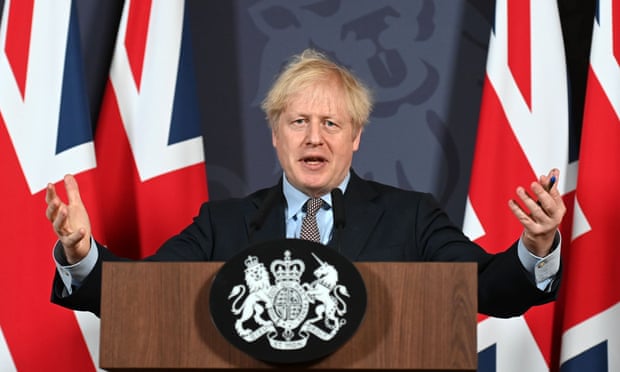The UK’s post-Brexit trade deal with Brussels delivers a “historic resolution” making the country a “friendly neighbour” to the EU, Boris Johnson will tell MPs on Wednesday as they vote on the agreement.
The deal is expected to sail through the parliamentary approval process in just a day, with the backing of Labour and after the pro-Brexit European Research Group of Conservative MPs indicated on Tuesday that it would support it.
In a speech to parliament ahead of the vote, the prime minister will hail the deal sealed on Christmas Eve, arguing that it represents “how Britain can be at once European and sovereign”, as well as praising negotiators for securing it at “astonishing speed” in the “teeth of a pandemic”.
Despite a hostile response to the deal from fishing industry leaders and boat owners, the legal advisory committee of the ERG declared that it “preserves the UK’s sovereignty”. The verdict from the group’s so-called “star chamber” – which has been poring over the fine print of the 1,246-page trade agreement – represents a boost for Johnson. The ERG, thought to number about 70 Tories, represented a constant thorn in Theresa May’s side over Brexit during her turbulent time in No 10.
Keir Starmer has urged his MPs to vote for the agreement, but the Labour leader is facing a high-profile rebellion over concerns that he is “falling into the trap of rallying around this rotten deal”. Regardless, the European Union (Future Relationship) bill is expected to pass easily, despite the Scottish National party, the Liberal Democrats, Plaid Cymru, the Democratic Unionist party, the Social Democratic and Labour party and Alliance all indicating that they will not support it.
The government published an 80-page draft version of the bill on Tuesday, giving MPs less than 24 hours to study it ahead of parliament being recalled for a day on Wednesday to approve the deal. The bill, expected to be voted on by MPs at 2.30pm, will then also have to clear the Lords before it receives royal assent either late on Wednesday night or early Thursday morning.
The fast-tracking of the legislation has been strongly condemned by the Hansard Society, a leading source of independent research on parliamentary affairs. Brigid Fowler, a senior researcher who is a highly respected expert on parliamentary processes, said it amounted to an “abdication of parliament’s constitutional responsibilities to deliver proper scrutiny of the executive and the law”.
A report by the cross-party Brexit select committee said that the deal’s compressed parliamentary timetable was “unavoidable but concerning”.
“One concerning consequence of the agreement being reached so late is that members of the parliament have been left with very little time in which to read the [deal],” it read. “This means the [deal] will not be subject to detailed scrutiny before a vote in the Commons, which is an unsatisfactory but now unavoidable outcome.”
Opening Wednesday’s debate, Johnson will tell MPs that the central purpose of the legislation is to “accomplish something which the British people always knew in their hearts could be done, but which we were told was impossible”.
He is to add: “This bill demonstrates how Britain can be at once European and sovereign. And our negotiators accomplished their feat with astonishing speed … We have done this in less than a year, in the teeth of a pandemic.
“We will now open a new chapter in our national story, striking free trade deals around the world, adding to the agreements with 63 countries we have already achieved, and reasserting global Britain as a liberal, outward-looking force for good.
“Those of us who campaigned for Britain to leave the EU never sought a rupture with our closest neighbours … but a resolution, a resolution of the old and vexed question of Britain’s political relations with Europe, which bedevilled our post-war history.”
He is expected to conclude: “With this bill, we shall be a friendly neighbour, the best friend and ally the EU could have, working hand in glove whenever our values and interests coincide while fulfilling the sovereign wish of the British people to live under their own laws, made by their own elected parliament. That is the historic resolution delivered by this bill.”
In a statement on Tuesday, the ERG’s legal advisory committee said: “Our overall conclusion is that the agreement preserves the UK’s sovereignty as a matter of law and fully respects the norms of international sovereign-to-sovereign treaties.
“The ‘level playing field’ clauses go further than in comparable trade agreements, but their impact on the practical exercise of sovereignty is likely to be limited if addressed by a robust government.
“In any event they do not prevent the UK from changing its laws as it sees fit at a risk of tariff countermeasures, and if those were unacceptable the agreement could be terminated on 12 months’ notice.”
David Jones, the ERG’s deputy chairman, told the Guardian he would be voting for the deal, adding: “What this does is replaces the arrangements under the treaty on [the] European Union, which is what we were in before as a member state, with something that is a straightforward, clear, free trade agreement of a sort that Conservatives are supportive of.”






